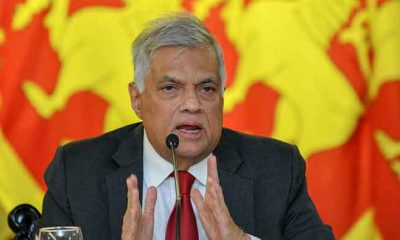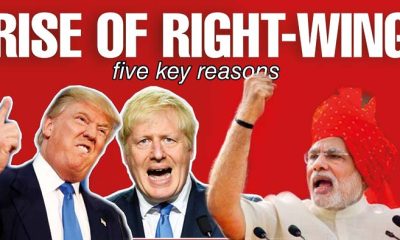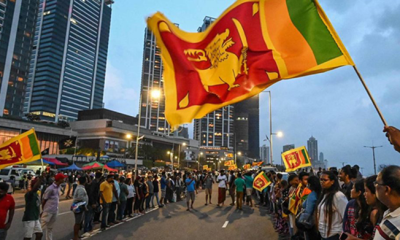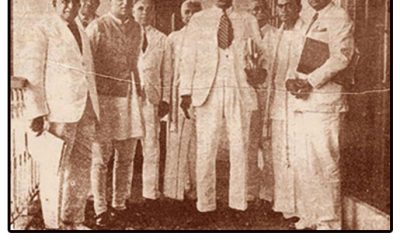News
Parliament rejected two anti-corruption proposals

Ex-COPE Chairman makes another revelation:
By Shamindra Ferdinando
Parliament has blocked two specific proposals made by MP Prof. Charitha Herath in his capacity as the Chairman of the Committee on Public Enterprises (COPE) to enable the Parliamentary Watchdog Committee to engage the Attorney General in high profile corruption cases, directly.
SLPP National List MP Herath lost the COPE Chairmanship with the prorogation of the Parliament on 28 July by President Ranil Wickremesinghe. The prorogation results in suspension of all business before the House and quashed all proceedings pending at the time, except impeachments.
Prof. Herath told The Island yesterday (25) that in consultation with Auditor General W. P. C. Wickremaratne, he had requested for the modification of Standing Orders 120, several months back, to permit the COPE to call for Attorney General’s interventions as and when necessary. If that was not acceptable, Parliament should approve specific requests made by him on behalf of the COPE, he suggested.
Prof. Herath said that the alternative, too, has been rejected. Responding to another query, he said that he had submitted the proposals to the Parliamentary Committee on Standing Orders. The Committee consists of nine members, including the Speaker, the Deputy Speaker and the Deputy Chairman of Committees.
Appearing before the Parliamentary Committee on Standing Orders, Prof. Herath also suggested that if proposals submitted in writing weren’t acceptable then at least a representative of the Attorney General should be allowed to participate in the COPE proceedings. That proposal too was turned down.
Prof. Herath said that the rejection of specific measures to address corruption accusations should be examined against the backdrop of the economic fallout of waste, corruption, irregularities and mismanagement of the national economy as well as the unprecedented recommendation by the United Nations Human Rights Council (UNHRC) to investigate economic crimes that impact on human rights and the tracing and recovery of stolen assets.
Prof. Herath alleged that the Parliament should be seriously concerned over the Geneva intervention especially because the country was seeking immediate assistance from the International Monetary Fund (IMF). Asserting that the situation was so grave that even USD 2.9 bn loan facility spread over a period of four years couldn’t revive the national economy, Prof. Herath emphasised that streamlining of public sector enterprises was a prerequisite for the economic recovery process. Therefore, corruption had to be curtailed by taking tangible measures, he said.
Prof. Herath said that though the particular Standing Order had been amended it didn’t meet their aspirations. What has been approved by the Parliament was inadequate to meet the growing threat posed by influential racketeers, the outspoken MP said. Prof. Herath has closed ranks with the dissident SLPP group, led by Party Chairman Prof. G.L. Peiris, and Dullas Alahapperuma. Other members of the group are Prof. Channa Jayasumana, Dr. Nalaka Godahewa, Dilan Perera, Dr. Upali Galappatti, Dr. Thilak Rajapaksa, Lalith Ellawala, K.P. S. Kumarasiri, Wasantha Yapa Bandara, Gunapala Ratnasekera and Udayana Kiridigoda.
Prof. Herath said that as the SLPP declined to allocate time for members of the rebel group, he was compelled to obtain five minutes from the Opposition to take up the issue in Parliament.Appreciating Opposition Leader Sajith Premadasa and Chief Opposition Whip Lakshman Kiriella for giving him the opportunity, Prof. Herath pointed out how a carefully prepared set of proposals to strengthen the COPE had been rejected.
Prof. Herath stressed that the intervention of the COPE was required as the Secretaries to the Ministries often failed to proceed with the instructions issued to them. The MP found fault with section 3 and 4 of Standing Orders 120. Declaring that though the Parliament was routinely blamed for its failure to arrest corruption, MP Herath said that Members of Parliament weren’t aware of what was going on. He also called for the strengthening of Standing Orders 119, 120 and 121 that dealt with the Committee on Public Accounts (COPA), COPE and the Committee on Public Finance (COPF), respectively.
MP Herath declared in Parliament that the crux of the matter was that those appointed members of the Cabinet represented the interests of the Executive and thereby undermined the very basis of the responsibilities of the House. The undeniable truth was that the Cabinet ministers didn’t represent the interests of the Parliament. “In other words, they worked against the collective responsibility as members of Parliament to ensure financial discipline,” MP Herath said, pointing out that in some countries the lawmakers were not entrusted with the task of decision-making.
Referring to Executive Sub-Committees to be established, Prof. Herath emphasized the pivotal importance of recognizing their responsibilities. If they were answerable to the Executive there would be serious consequences pertaining to the parliamentary system. Executive Sub-Committees shouldn’t be at the expense of the Parliament, the MP said, underscoring the responsibility of the part of all political parties represented in Parliament to take immediate remedial measures.
The rejection of the COPE proposals meant that the Parliament,as an institution hadn’t been sensitive to the recent public upheaval that forced Gotabaya Rajapaksa, elected with a staggering 6.9 mn votes to give up the presidency and literally flee for his life.
Ranil Wickremesinghe, who had been elected by Parliament to complete the remainder of the five-year term secured by Gotabaya Rajapaksa, and the SLPP, hadn’t realised the need to introduce urgent reforms, the MP alleged.Prof. Herath also questioned the rationale behind setting up of the National Council when the powers that be deprived the existing mechanisms required power to achieve their objectives.
News
US sports envoys to Lanka to champion youth development

The U.S. Embassy in Colombo welcomed the U.S. Sports Envoys to Sri Lanka, former National Basketball Association (NBA) and Women’s National Basketball Association (WNBA) players Stephen Howard and Astou Ndiaye, from June 8 through 14.
The Public Diplomacy section of the U.S. Embassy said that it would launch a weeklong basketball program intended to harness the unifying power of sports, made possible through collaboration with Foundation of Goodness and IImpact Hoop Lab.
While in Sri Lanka, Howard and Ndiaye, both retired professional basketball players, will conduct a weeklong program, Hoops for Hope: Bridging Borders through Basketball. The Sports Envoys will lead basketball clinics and exhibition matches and engage in leadership sessions in Colombo and Southern Province for youth aged 14-18 from Northern, Uva, Eastern and Western Provinces, offering skills and leadership training both on and off the court. The U.S. Envoys will also share their expertise with the Sri Lanka Basketball Federation, national coaches, and players, furthering the development of basketball in the country. Beyond the clinics, they will collaborate with Sri Lankan schoolchildren to take part in a community service project in the Colombo area.
“We are so proud to welcome Stephen and Astou as our Sports Envoys to Sri Lanka, to build on the strong people-to-people connections between the United States and Sri Lanka,” said U.S. Ambassador Julie Chung. “The lessons that will be shared by our Sports Envoys – communication, teamwork, resilience, inclusion, and conflict resolution – are essential for leadership development, community building, equality, and peace. The U.S. Sports Envoy program is a testament to our belief that sports can be a powerful tool in promoting peace and unity.”
News
Rahuman questions sudden cancellation of leave of CEB employees

SJB Colombo District MP Mujibur Rahuman in parliament demanded to know from the government the reasons for CEB suspending the leave of all its employees until further notice from Thursday.
MP Rahuman said that the CEB has got an acting General Manager anew and the latter yesterday morning issued a circular suspending leave of all CEB employees with immediate effect until further notice.
“We demand that Minister Kanchana Wijesekera should explain this to the House. This circular was issued while this debate on the new Electricity Amendment Bill was pending. There are many who oppose this Bill. The Minister must tell parliament the reason for the urge to cancel the leave of CEB employees,” the MP said.However, Speaker Mahinda Yapa Abeywardena prevented Minister Wijesekera responding to the query and said that the matter raised by MP Rahuman was not relevant.
News
CIPM successfully concludes 8th Annual Symposium

The Chartered Institute of Personnel Management (CIPM) successfully concluded the 8th Annual CIPM Symposium, which took place on 31st May 2024. Themed “Nurturing the Human Element—Redefining HRM in a Rapidly Changing World,” the symposium underscored the pivotal role of human resource management (HRM) in today’s dynamic global landscape. Since its inception in 1959, CIPM has been dedicated to advancing the HR profession through education, professional development, and advocacy, solidifying its position as Sri Lanka’s leading professional body for HRM.
Ken Vijayakumar, the President of the CIPM, graced the occasion as the chief guest. The symposium commenced with the welcome address by the Chairperson, Prof. Arosha Adikaram, followed by the Web Launch of the Symposium Proceedings and Abstract Book by the CIPM President. The event featured distinguished addresses, including a speech by Chief Guest Ken Vijayakumar, President of CIPM, and an address by Guest of Honor Shakthi Ranatunga, Chief Operating Officer of MAS Holdings Pvt. Ltd., Sri Lanka.
The symposium also featured an inspiring keynote address by Prof. Mario Fernando, Professor of Management and Director of the Centre for Cross Cultural Management (CCCM) at the University of Wollongong, Australia.
Vote of Thanks of the inauguration session was delivered by Dr. Dillanjani Weeratunga, Symposium Co-chair.
The symposium served as a comprehensive platform for researchers to present their findings across a wide range of critical topics in HRM. These included Cultural Diversity and Inclusion, Talent Development and Retention, Ethical Leadership and Corporate Social Responsibility, Adapting to Technological Advancements, Mental Health and Well-being at Work, Global Workforce Challenges, Employee Empowerment, and Reskilling and Upskilling.
The plenary session was led by Prof. Wasantha Rajapakse. Certificates were awarded to the best paper presenters during the valedictory session, followed by a vote of thanks delivered by Kamani Perera, Manager of Research and Development.
The annual symposium of CIPM was a truly inclusive event, attracting a diverse audience that spanned undergraduates, graduates, working professionals, research scholars and lecturers. This widespread interest highlights the symposium’s significance in the field of HRM, offering a unique opportunity for everyone to network and learn from scholarly brains.The CIPM International Research Symposium was sponsored by Hambantota International Port, Sri Lanka Institute of Information Technology (SLIIT), E B Creasy & Co. PLC, and Print Xcel Company.
























